Bill Starr
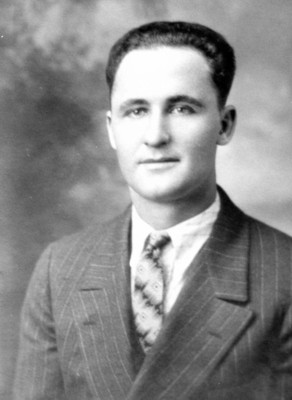
WILLIAM PINKSTON "BILL" STARR
1902-1949
Copyright March 2013 Linda Sparks Starr
William Pinkston Starr, nicknamed “Bill”, was born in Sunnyside,
Georgia, December 11, 1902, the eldest son and second child of Harry
Starr and Pauline (Rankin). As southern tradition dictated, he was
named for each of his grandfathers: William R. Rankin and John Pinkston
Starr. Although he was born in Georgia, and lived there for a few
years, he was probably too young to have any memories of the state. No
one wrote down the childhood stories he told his children and he was
gone before his nieces and nephews were interested.
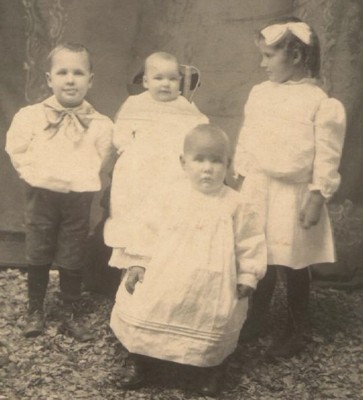
L to R: William and siblings Estelle, Harry and Alice
The southeastern part of Oklahoma where the Starrs settled was the
Choctaw Nation, Indian Territory. Actually, "settled" isn’t the correct
word for Bill spent his early childhood in logging camps which moved
every few months. Although Bill had chores he was expected to do each
day, once they were done, he and other boys from the logging camps
probably had the run of the hamlet and nearby woods. Each move brought
new places to explore; summers especially were carefree. Along about
1911 things changed for these children. Their parents decided they
needed some schooling and Bill’s own father was chosen as the man to do
it. Harry had the most education of all the parents, and with promises
of payment for each child he took on, he took the necessary steps to
get a teacher’s certificate. Much to Harry’s surprise about 90
children appeared the first day of class. Adding to the surprise was
that over half were Indian children who understood little or no
English. Surely Bill, likely home taught before this, and others who
had received similar basic instruction, helped with the children who
had to begin at the beginning.
Bill and his siblings received a better than average education just by
sitting around their dining table. Both parents had finished high
school in days when that was equivalent to today’s college education.
Harry kept up with current events as best he could and Pauline’s
interests were certainly wider than the next meal. Bill was well
prepared for the high school level classes offered by Folsom Training
School when it was established in Smithville. "Training" referred to
the vocational and domestic skills that were incorporated in the
curriculum. Students would learn carpentry and cooking,
not just geometry and geography. Originally established by the
Methodist Church specifically for Indian students from all tribes,
whites were welcome and came to account for most of the student body.
Tuition and board fees were modest, and to meet those costs many
students worked in some capacity for the school, which attempted to be
self-supporting to the extent possible. There was a wide choice
of jobs: milking cows in the dairy, canning foods, running the school's
kitchen and laundry. Times were tough financially so most students
worked. The campus was at the north end of Smithville's main street.
Bill and his siblings lived at home and had a brief, easy walk
downhill to school.
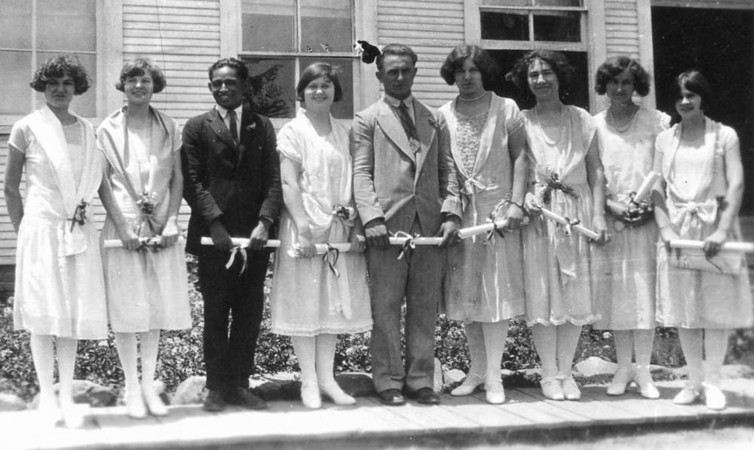
Nine of Fulsom's fourteen-member class of 1924. William is in the center.
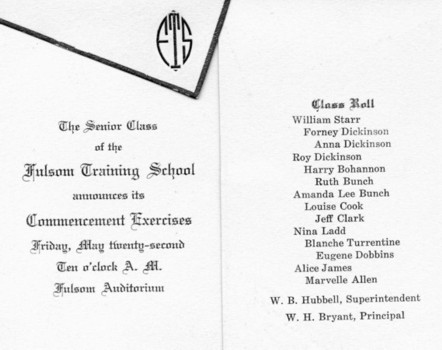
Bill graduated from Folsom in 1924, a full two years ahead of his older
sister Alice who taught a year after her freshman term. Harry was
likely having difficulty paying tuition for two with another coming on
plus expenses associated with the youngest four children. Bill’s
was a traditional family whose values and ideas were set during the
Victorian-era. The parents felt it was more important for males to get
a college education than for females -- who were expected to marry.
Thus Alice delayed her high school and later college education, but
Bill went straight through both Fosom and the University of Tulsa. I’m
sure Harry helped with his tuition at the University of Tulsa, but Bill
did his part. We know that first year he washed dishes in exchange for
his room and board. He probably worked at that or other jobs the
next three years, but we have confirmation for only that first year. He
graduated from the University of Tulsa in 1928.
It was a rare privilege in those days for anyone from a low-income
rural background to attend college, let alone graduate. His parents and
siblings were very proud of him. Words used to describe him
include: gregarious, confident and personable. At Folsom he
was a member of the debate team and drama club, plus he had a part in
most choral programs. He had a fine voice. One of his part
time jobs in Tulsa was singing with The Tulsans, a male choral group
who performed for KVOO (the "Voice of Oklahoma") broadcasts. He
also sang with the elite Boston Avenue Methodist Church's choir.
According to his daughter, Ann, each Christmas season he sang the bass
solo in The Messiah. According to his wedding announcement, while at
the University, Bill was a member of Phi Delta social and Phi Mu Alpha
musical fraternities.
Bill married Edith Eileen Cargile, daughter of a reportedly
prominent
Tulsan with some connection to management with the Public Service
Company, the local electric utility. The married in Tulsa's First
Christian Church on 6 May 1931.
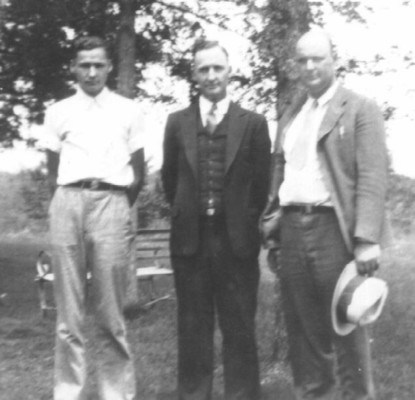
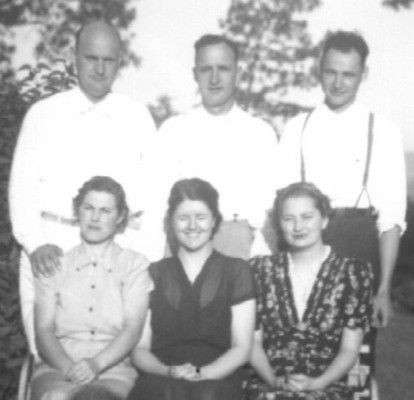
Left: Harry Starr's sons: Jack, William and
Harry. Right: Harry, William and Jack
with their wives Elda, Edith and Glendon.
Bill worked for Public Service Company
for fifteen or sixteen years. Part if not all the time he was
a meter reader, an unimpressive career today. However, this was the Depression years and any job was a good
job, and any steady job an excellent job. Two
children were born to them before they separated in 1941. He returned
to his parents home in Smithville shortly afterward, then later moved
to Vinita.
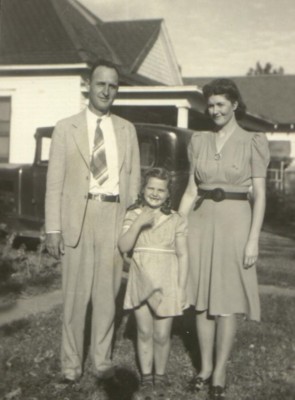
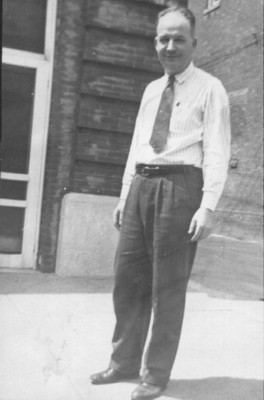
Bill and
Edith with their daughter Ann.
Bill ca. 1945; thought to be his last photo.
 William Pinkston Starr died in Vinita (one obit says
a hospital in Tulsa), Oklahoma, 13 July 1949 and is buried at Pinecrest
Memorial Park, Mena, Oklahoma in the Starr family spaces alongside his parents, three sisters and a
brother-in-law.
William Pinkston Starr died in Vinita (one obit says
a hospital in Tulsa), Oklahoma, 13 July 1949 and is buried at Pinecrest
Memorial Park, Mena, Oklahoma in the Starr family spaces alongside his parents, three sisters and a
brother-in-law.





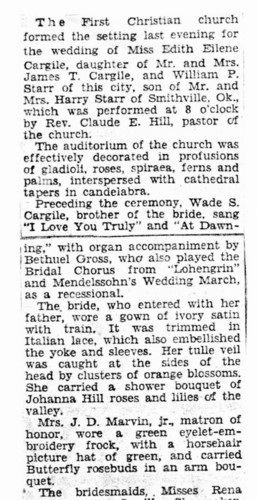
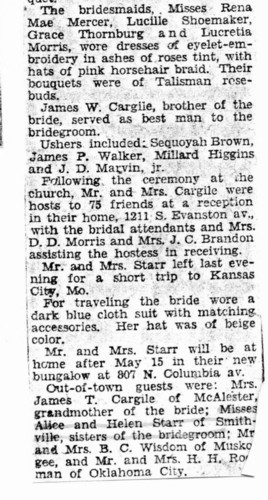

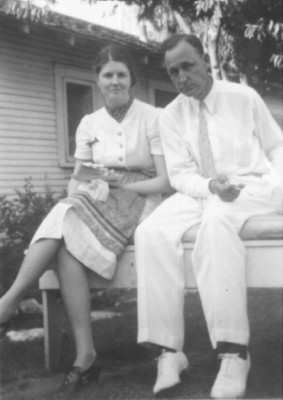
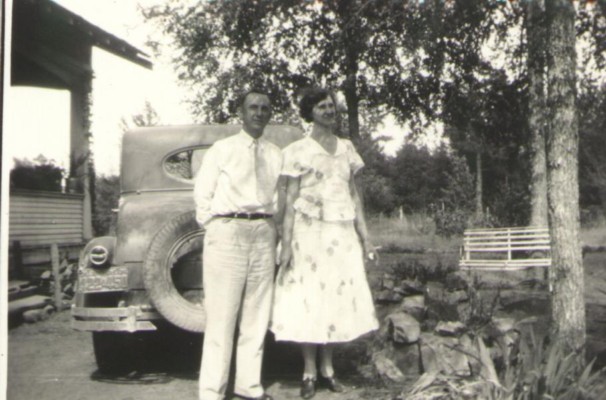




 William Pinkston Starr died in Vinita (one obit says
a hospital in Tulsa), Oklahoma, 13 July 1949 and is buried at Pinecrest
Memorial Park, Mena, Oklahoma in the Starr family spaces alongside his parents, three sisters and a
brother-in-law.
William Pinkston Starr died in Vinita (one obit says
a hospital in Tulsa), Oklahoma, 13 July 1949 and is buried at Pinecrest
Memorial Park, Mena, Oklahoma in the Starr family spaces alongside his parents, three sisters and a
brother-in-law.